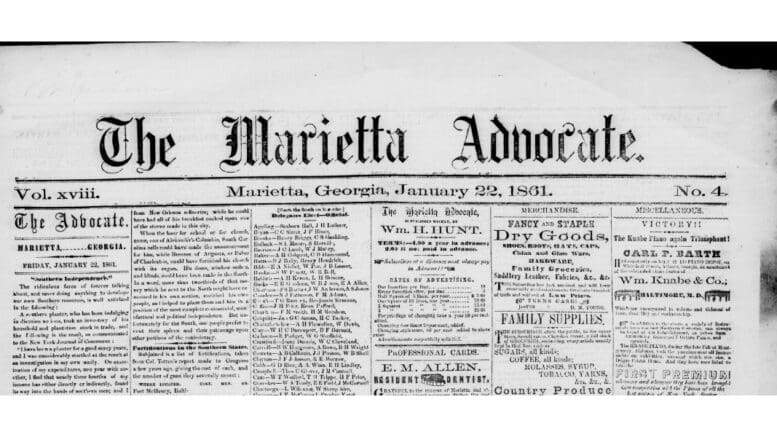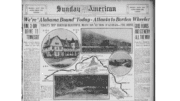The Courier uses the Georgia Historic Newspaper site housed at the University of Georgia to assemble history articles based on contemporary news reports.
From the formation of Cobb County in the 1830s until the end of the Civil War, the Marietta Advocate was the dominant newspaper in Cobb County. It ceased operations when U.S. General William Tecumseh Sherman occupied Atlanta and the region.
Late January in 1861 was a pivotal time for Georgia. A secession convention was organized on January 2 in response to the election of President Abraham Lincoln due to the abolitionist impulses of the early Republican Party.
The issue of slavery had reached a boiling point. It had already resulted in armed conflict in Kansas and Missouri between opponents and proponents of slavery in the years from 1854 to 1859.
On January 19, 1861, the convention voted for Georgia to leave the United States.
The Marietta Advocate on January 22, 1861, reported a celebratory mood among proponents of secession in Marietta. The first was a report that the signing of the secession proclamation was underway:
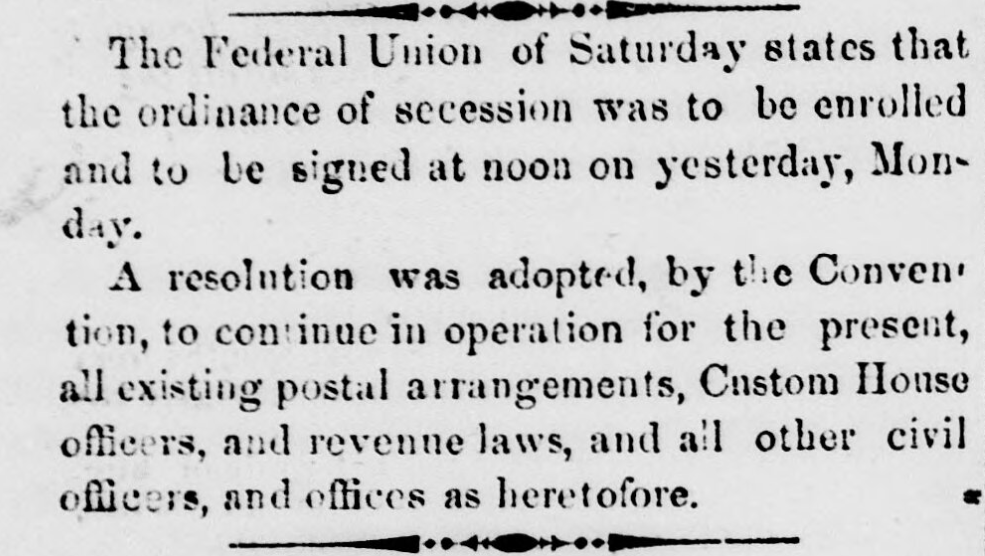
The Federal Union of Saturday states that the ordinance of secession was to be enrolled and to be signed at noon on yesterday, Monday. A resolution was adopted by the Convention to continue in operation for the present, all existing postal arrangements, Custom House officers, revenue laws, and all other civil officers and offices as heretofore.
The second was a brief article about a delegate from Cobb County, George Rice, who had been elected before the convention:
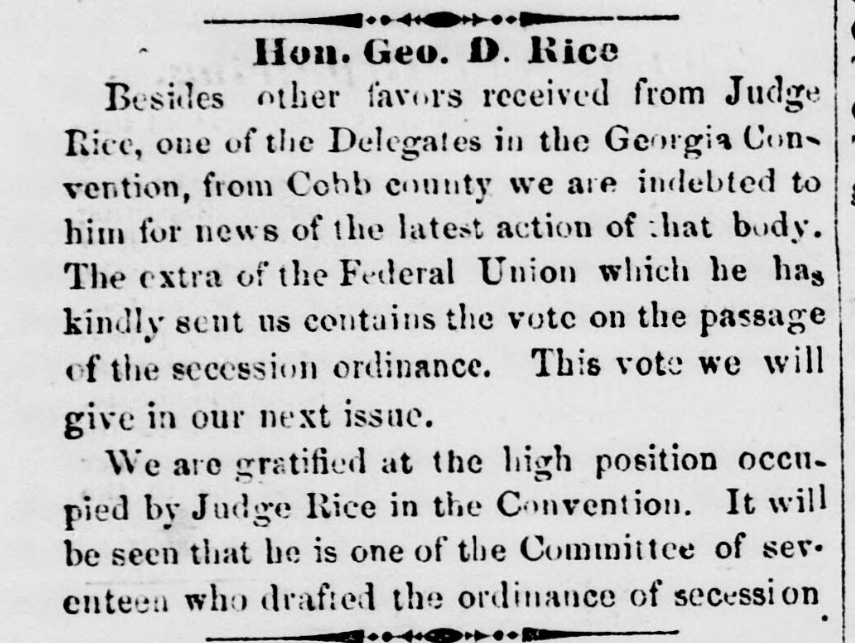
Hon. Geo. D. Rice.
Besides other favors received from Judge Rice, one of the Delegates in the Georgia Convention from Cobb County, we are indebted to him for news of the latest action of that body. The extra of the Federal Union which he has kindly sent us contains the vote on the passage of the secession ordinance. This vote we will give in our next issue.
We are gratified at the high position occupied by Judge Rice in the Convention. It will be seen that he is one of the Committee of seventeen who drafted the ordinance of secession.
Finally, the Advocate reported on celebrations that were held in Marietta:
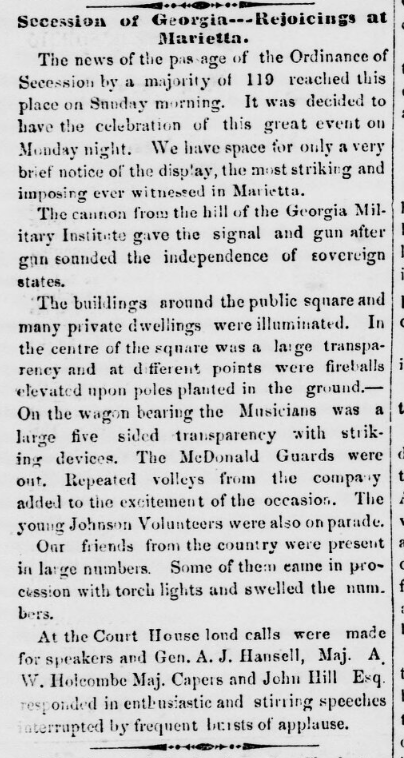
Secession of Georgia—Rejoicings at Marietta.
The news of the passage of the Ordinance of Secession by a majority of 119 reached this place on Sunday morning. It was decided to have the celebration of this great event on Monday night. We have space for only a very brief notice of the display, the most striking and imposing ever witnessed in Marietta.
The cannon from the hill of the Georgia Military Institute gave the signal, and gun after gun sounded the independence of sovereign states. The buildings around the public square and many private dwellings were illuminated. In the center of the square was a large transparency, and at different points were fireballs elevated upon poles planted in the ground.
On the wagon bearing the musicians was a large five-sided transparency with striking devices. The McDonald Guards were out. Repeated volleys from the company added to the excitement of the occasion. The young Johnson Volunteers were also on parade.
Our friends from the country were present in large numbers. Some of them came in procession with torchlights and swelled the numbers.
At the Courthouse, loud calls were made for speakers, and Gen. A. J. Hansell, Maj. A. W. Holcombe, Maj. Capets, and John Hill Esq. responded in enthusiastic and stirring speeches, accompanied by frequent bursts of applause.
While the Marietta Advocate celebrated secession in its earliest days, the carnival atmosphere was short-lived.
In March, the Confederacy was formed, with a constitution that enshrined slavery and called for its extension into other states and territories. Here’s an excerpt from the Confederate constitution:
In all such territory the institution of negro slavery, as it now exists in the Confederate States, shall be recognized and protected be Congress and by the Territorial government; and the inhabitants of the several Confederate States and Territories shall have the right to take to such Territory any slaves lawfully held by them in any of the States or Territories of the Confederate States.
In April, Confederate troops fired on Fort Sumter in South Carolina, triggering the American Civil War.
Within three years, the Confederacy was in shambles, and the occupation of the area surrounding Atlanta by U.S. troops put an end to the publication of the Marietta Advocate.
About the Marietta Advocate
According to Georgia Historic Newspapers:
The Advocate was the oldest newspaper published in Marietta, having published only a month earlier than the second-oldest newspaper, Helicon. The two newspapers were political rivals, as Calder’s Advocate supported the Democratic Party and the Helicon aligned itself with the Whig Party. The near-simultaneous appearance of competing newspapers in Marietta coincides with an economic boom in the area, despite Atlanta becoming the Western and Atlantic Railroad hub over Marietta.
The Marietta Advocate was originally called the Cherokee Advocate by Calder, even though Cobb County had already been carved out of Cherokee County . Soon thereafter it became the Marietta Advocate.
The paper was forced to shut down when Sherman occupied the area around Atlanta.
When the war ended, the Marietta Journal was founded by Raph McAlpin Goodman, a former editor of the Marietta Advocate who had left the Advocate because of his strong anti-secession views.
Digitized issues of the Marietta Advocate, the Marietta Helicon and early issues of the Marietta Journal (later the Marietta Daily Journal) can be found at the Georgia Historic Newspaper website, housed at the University of Georgia.

